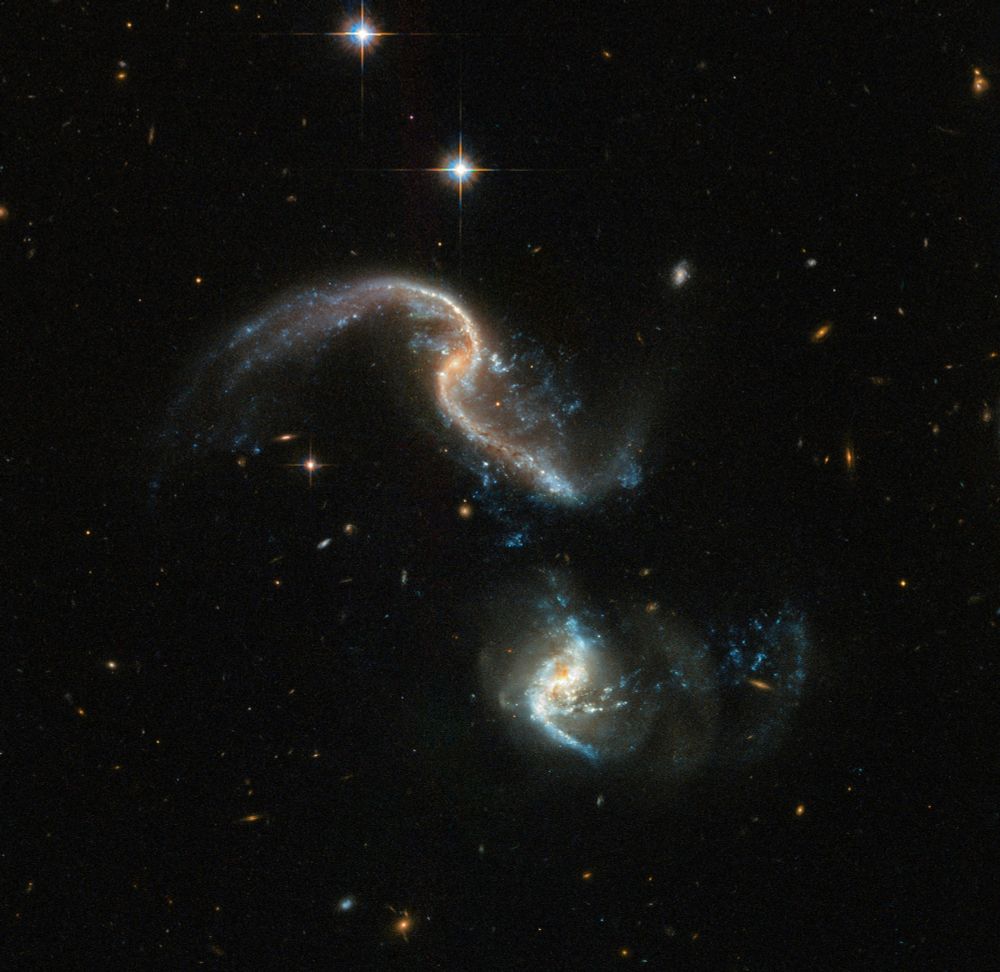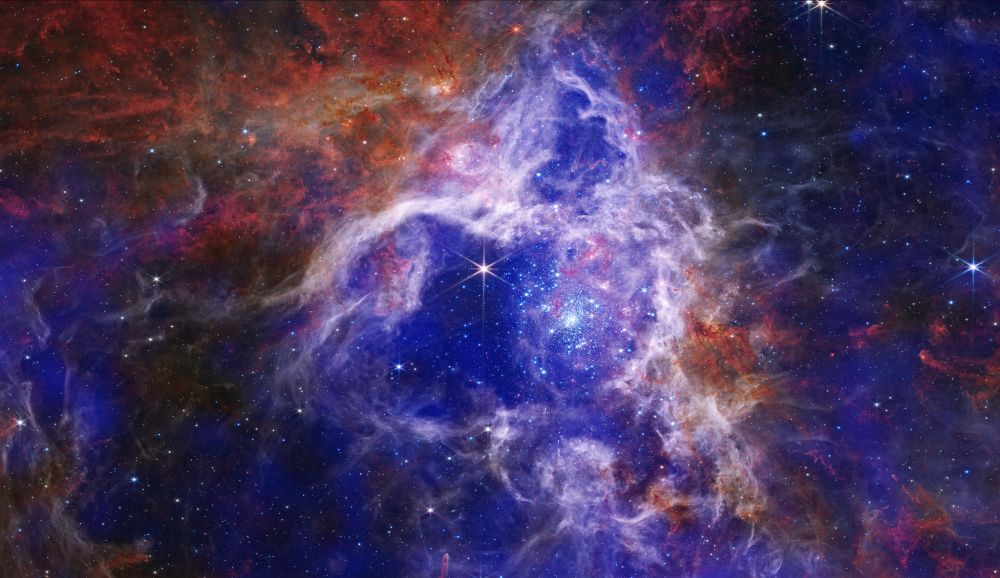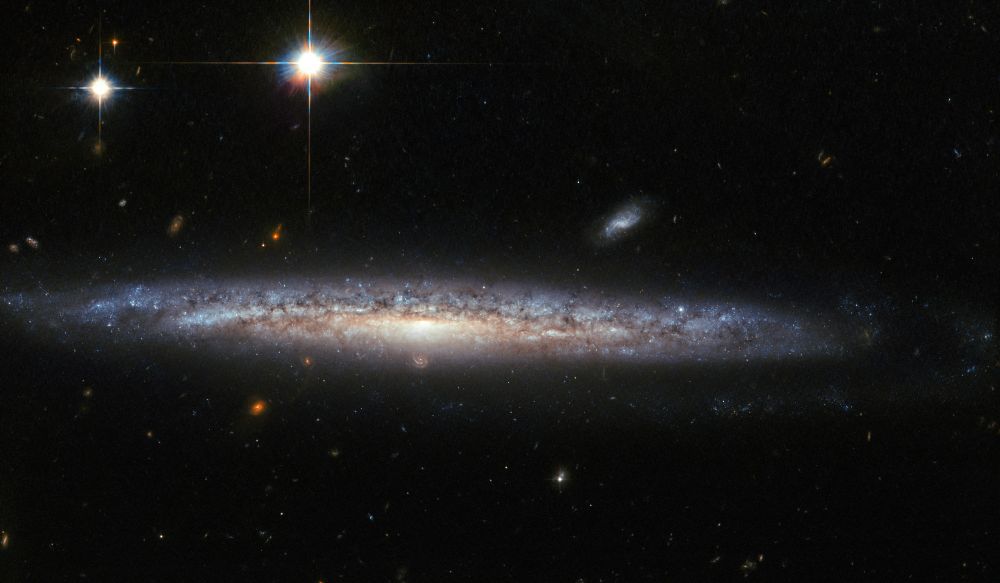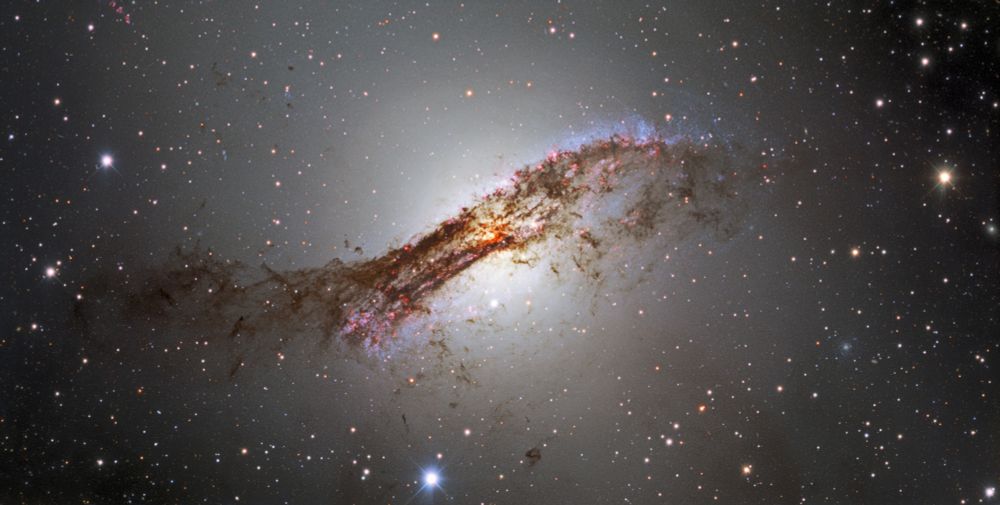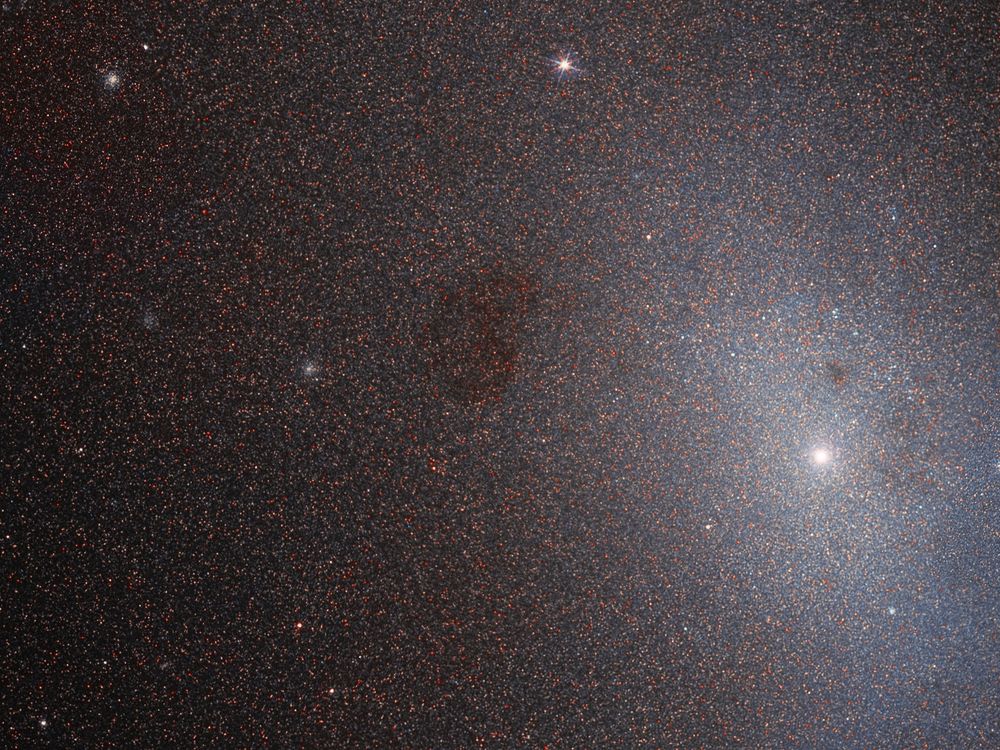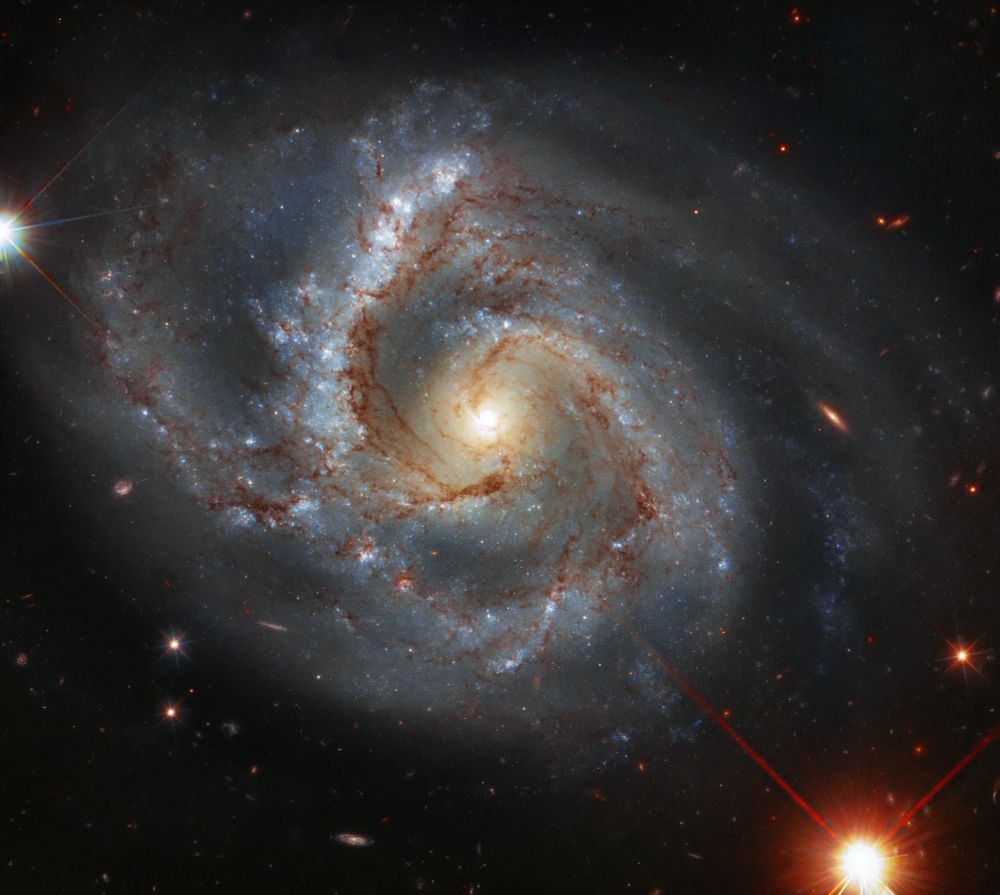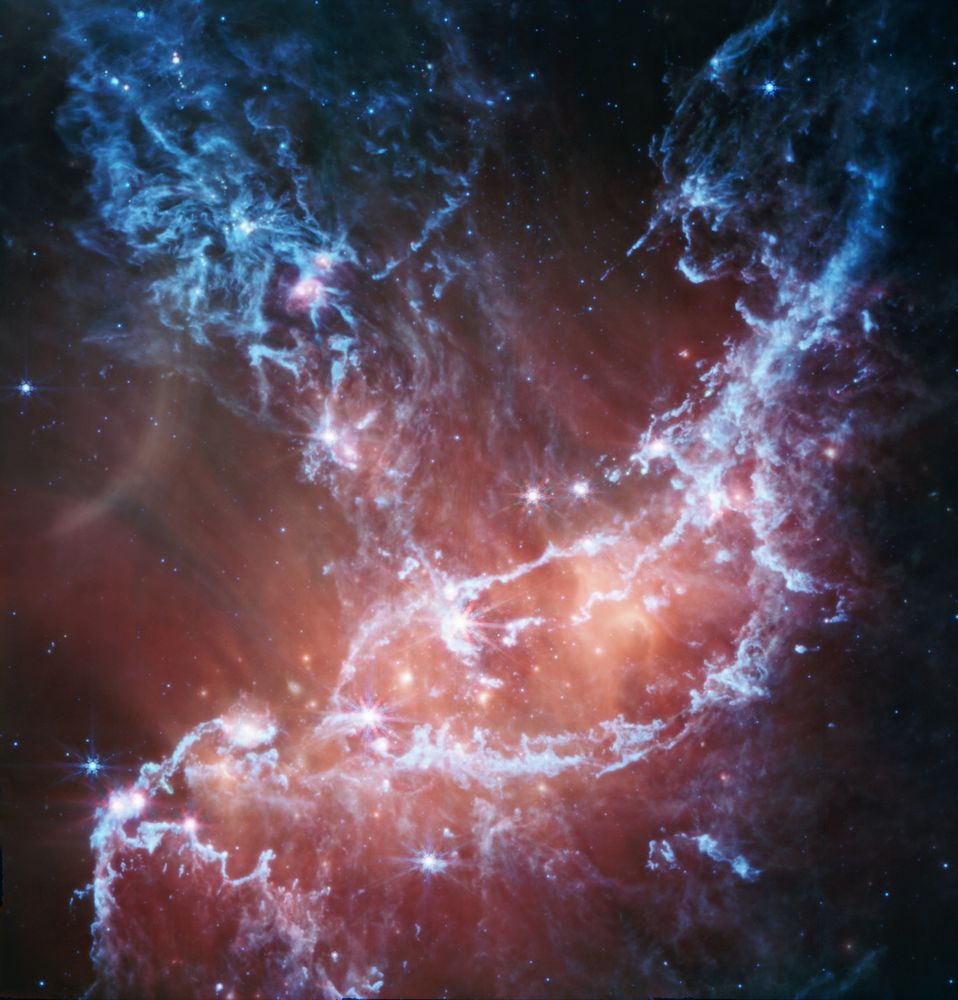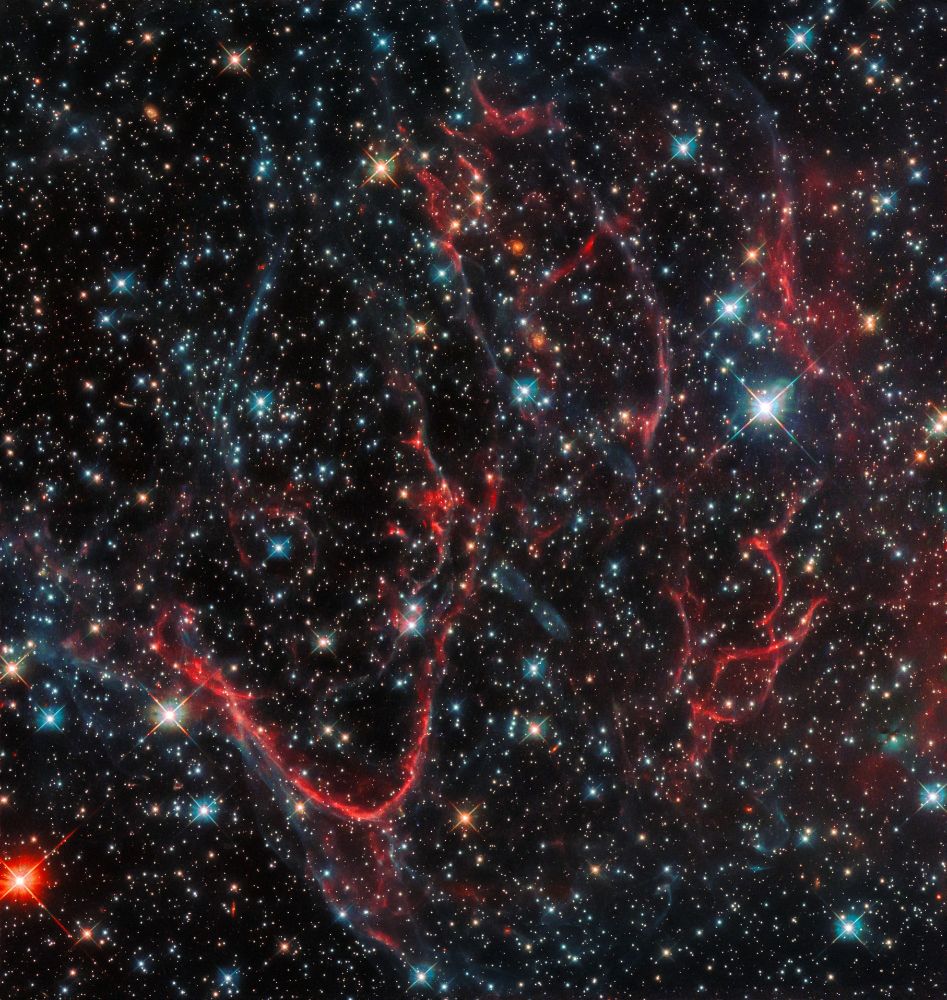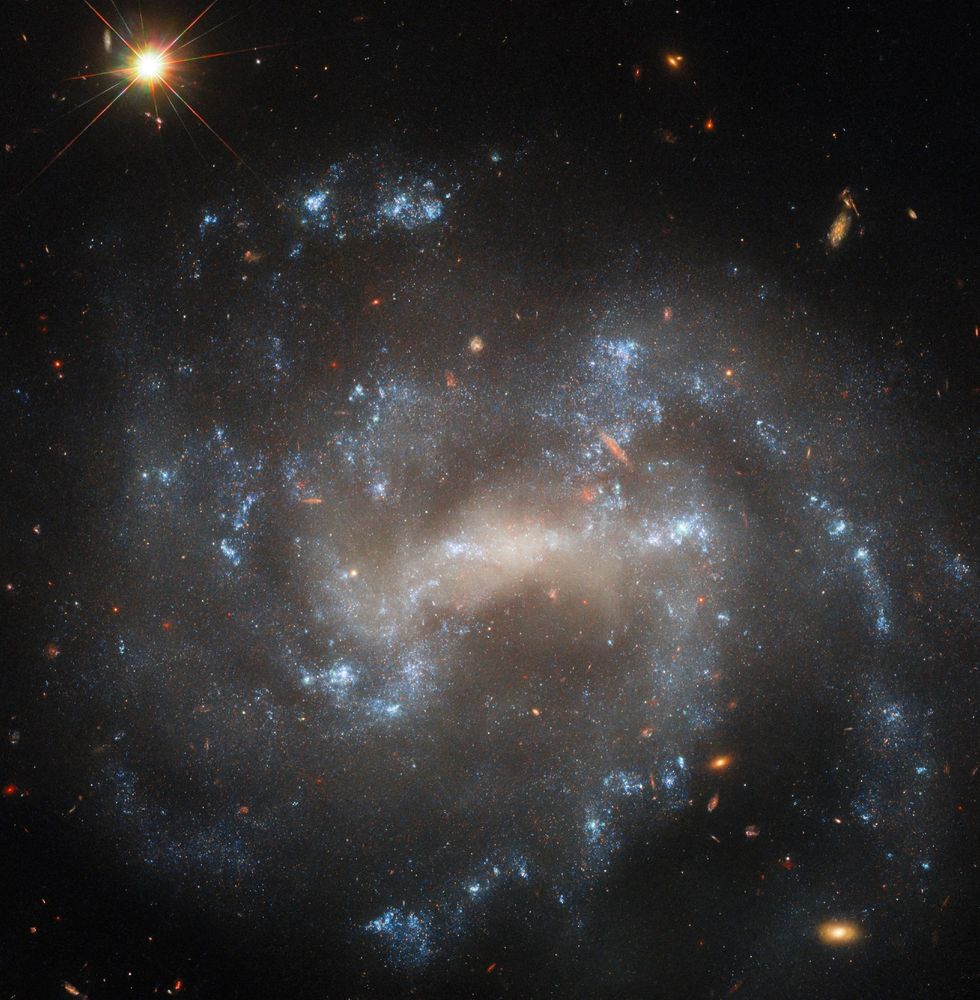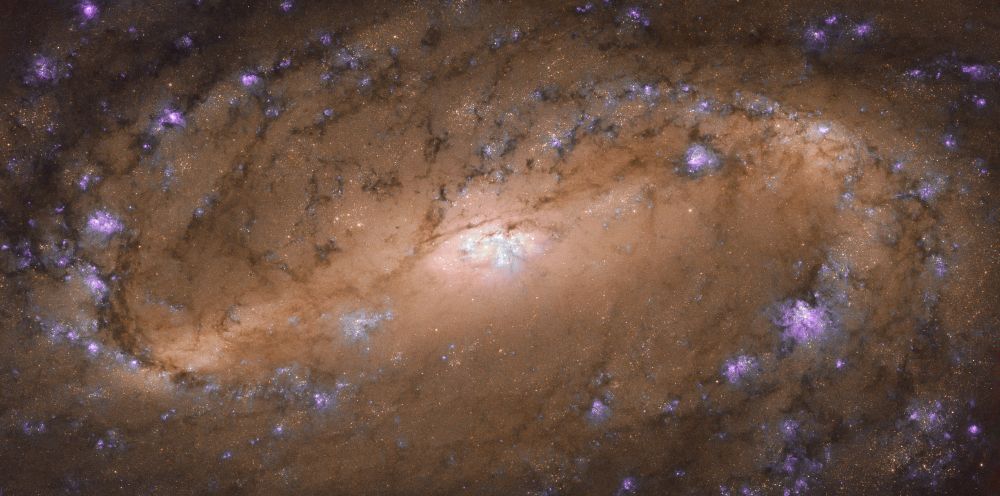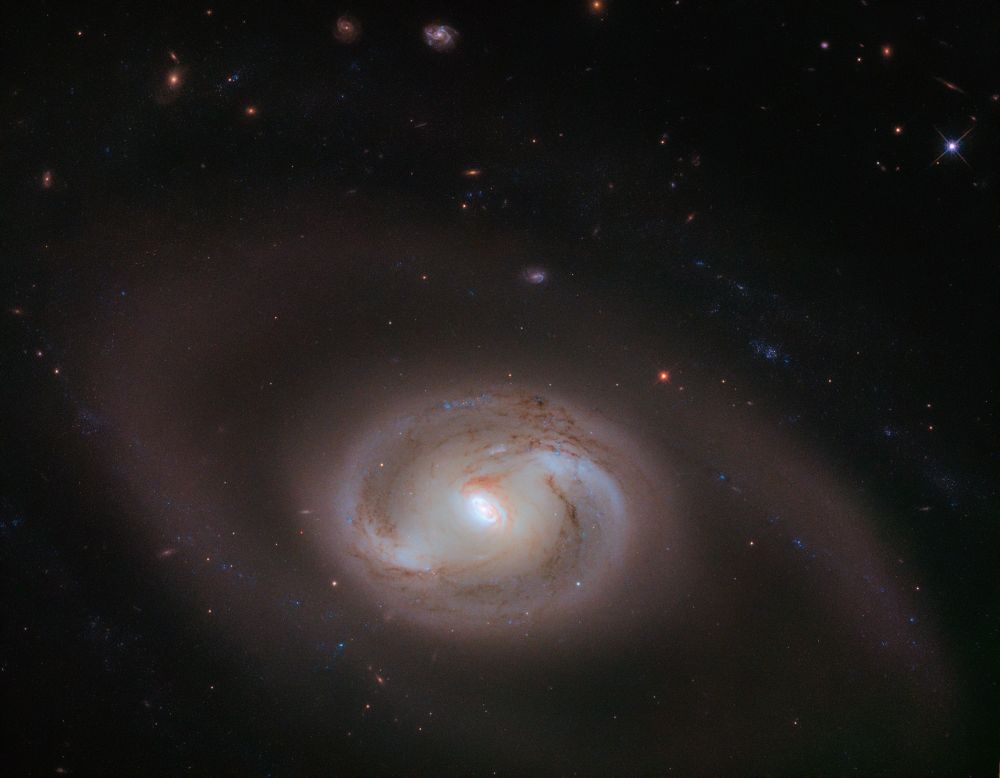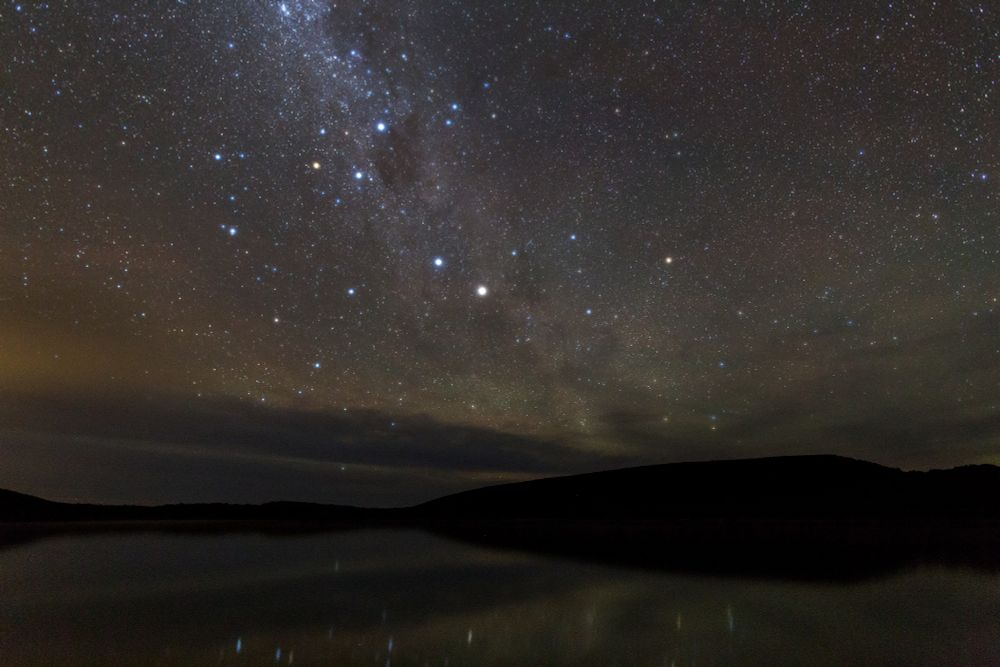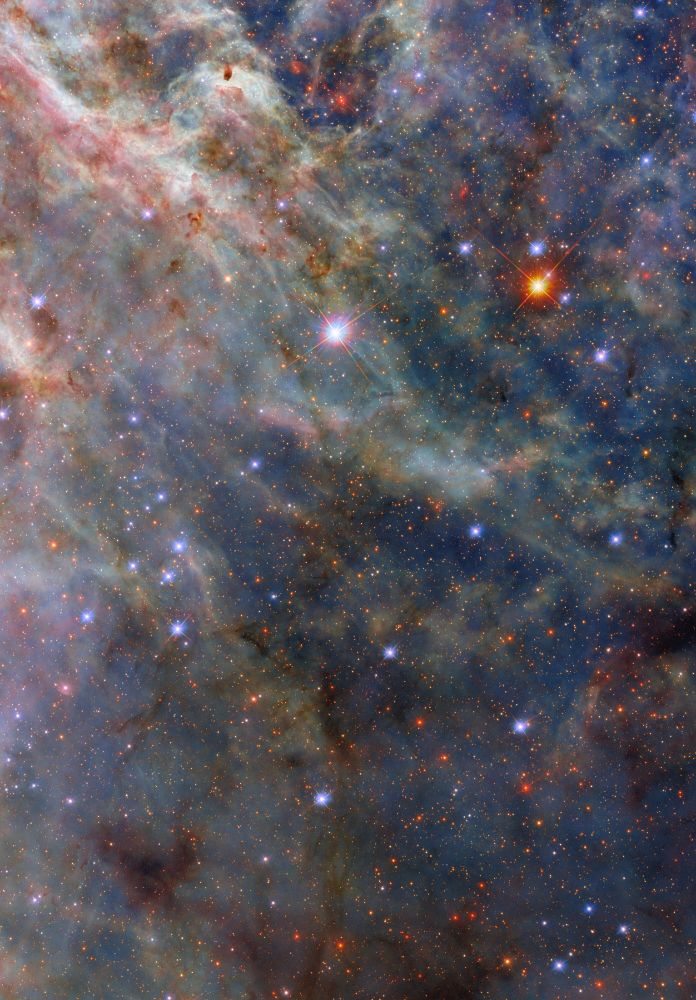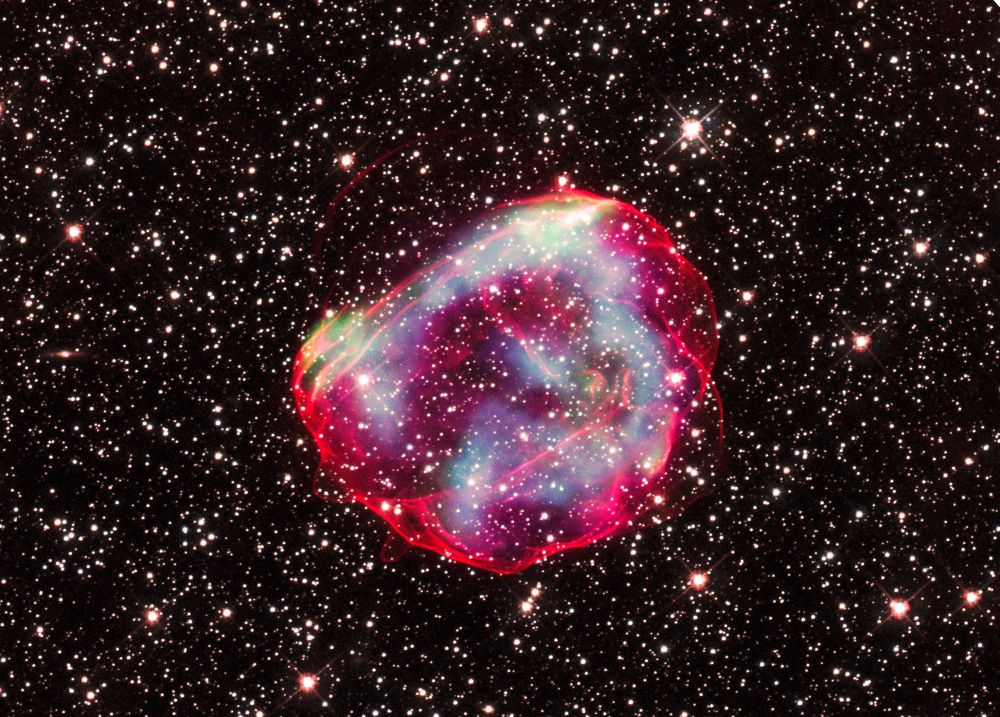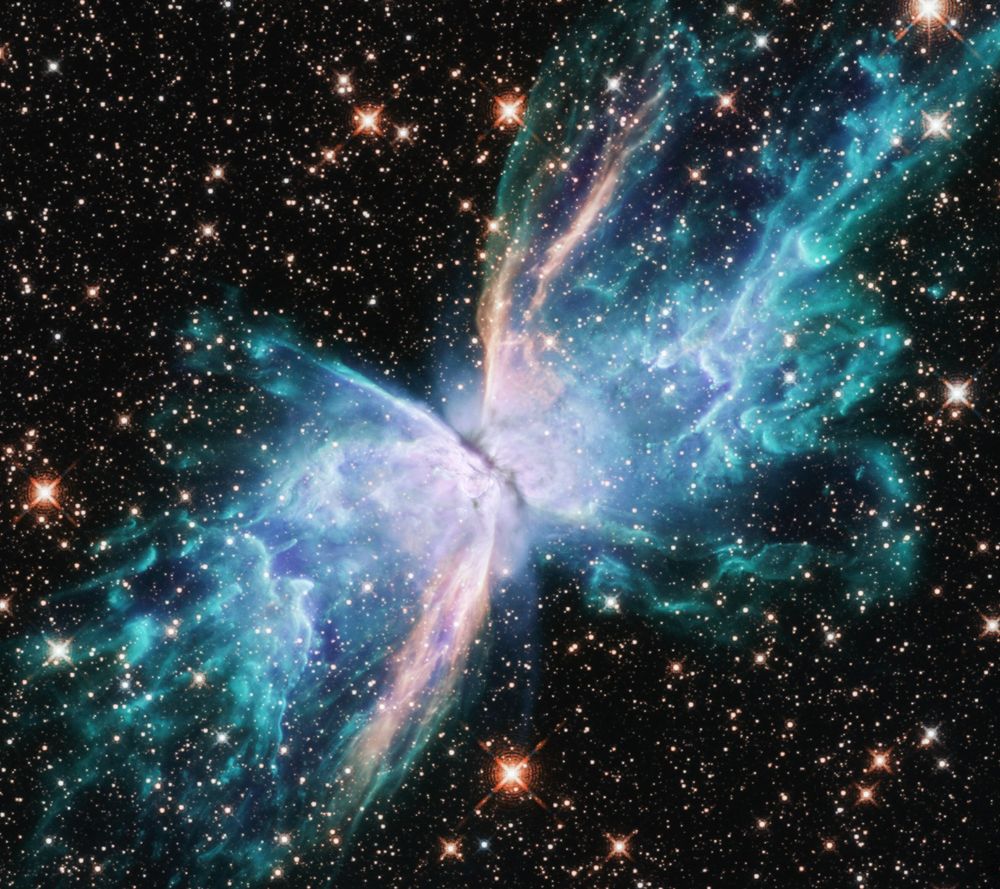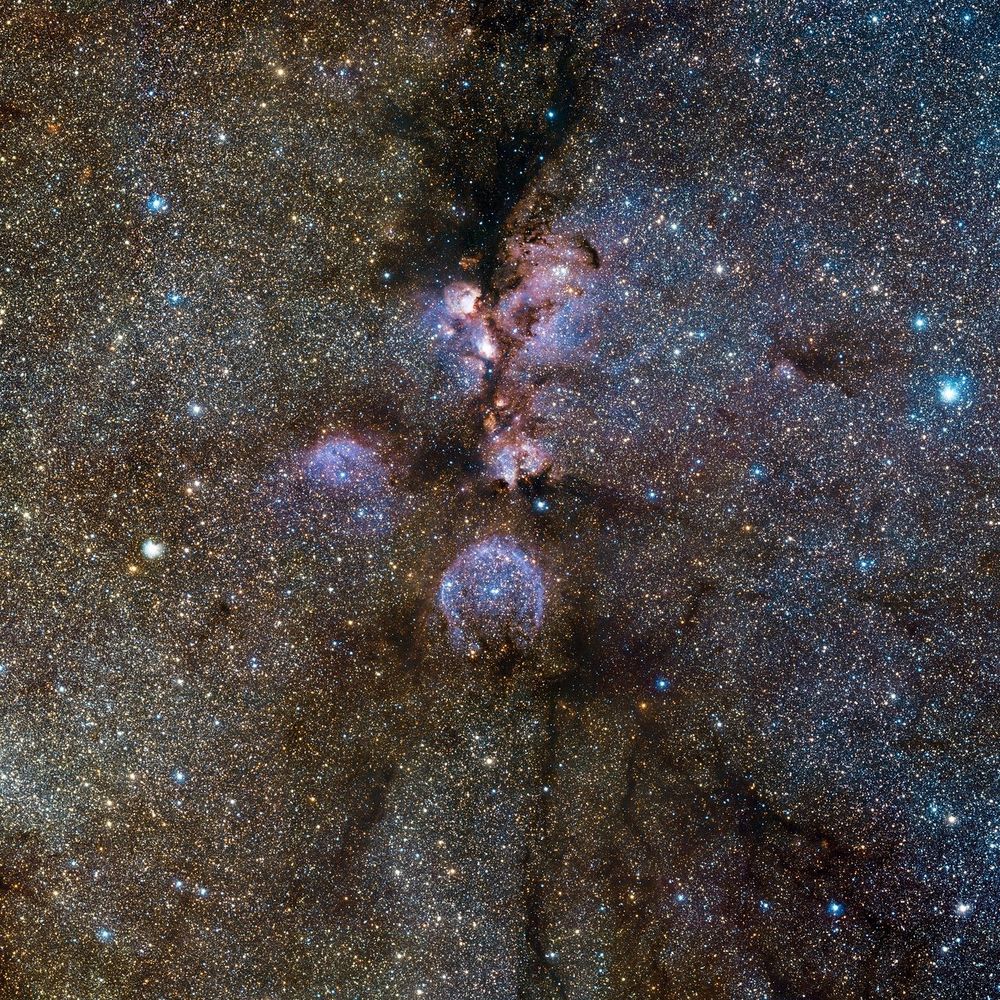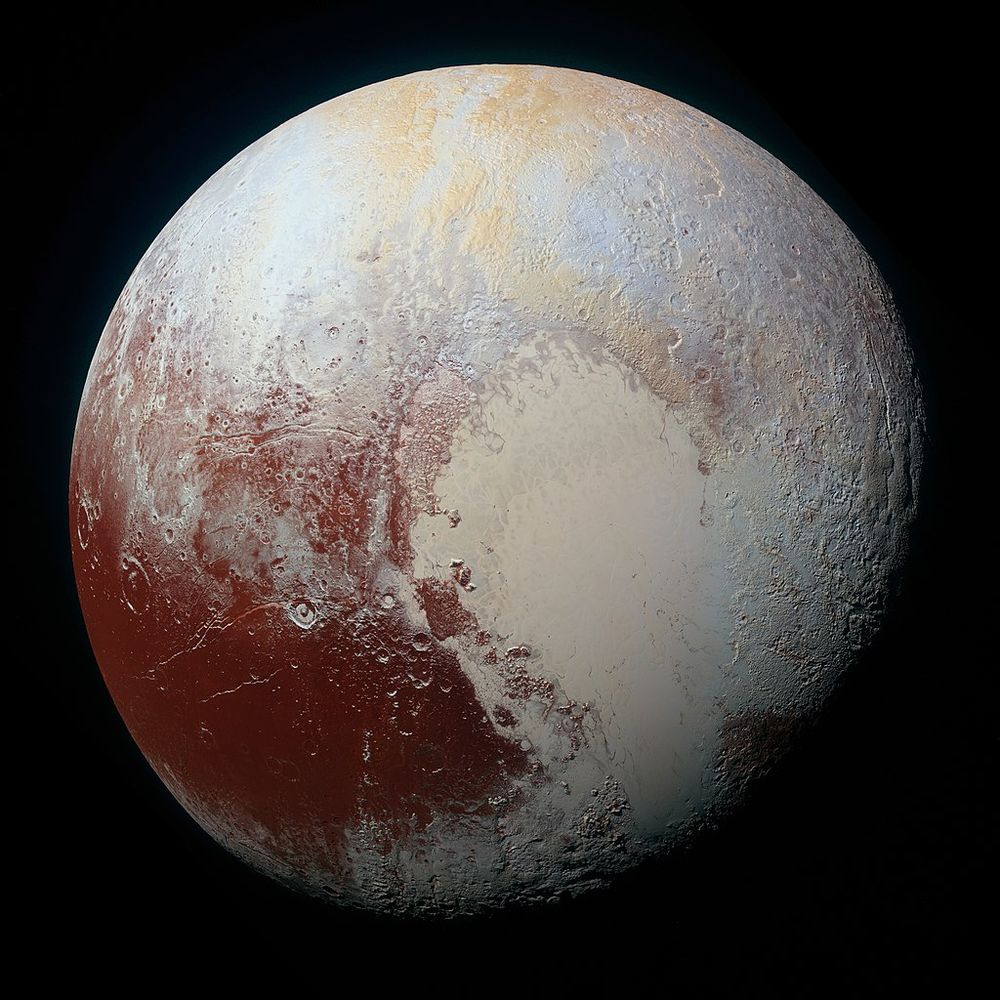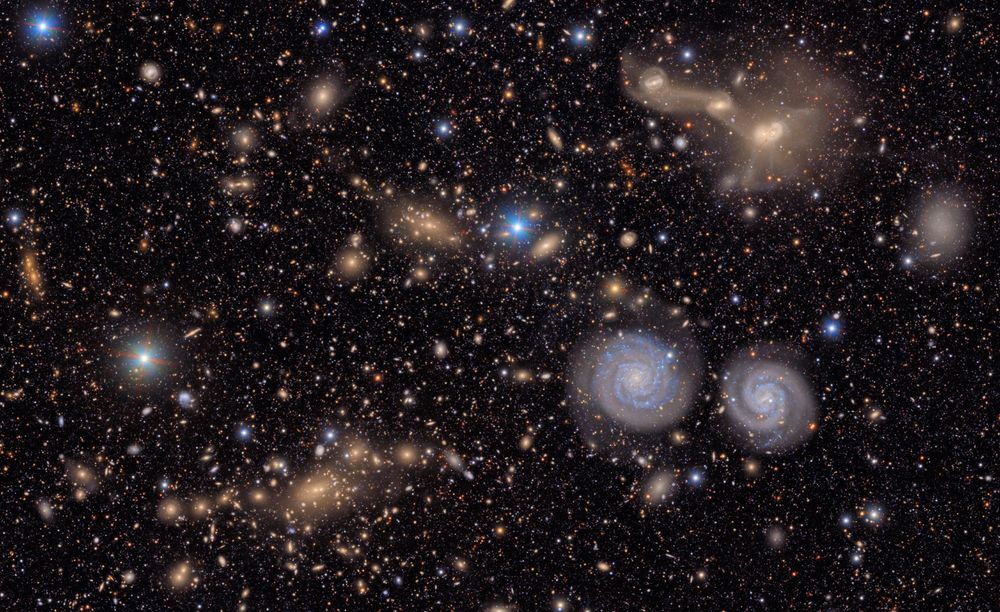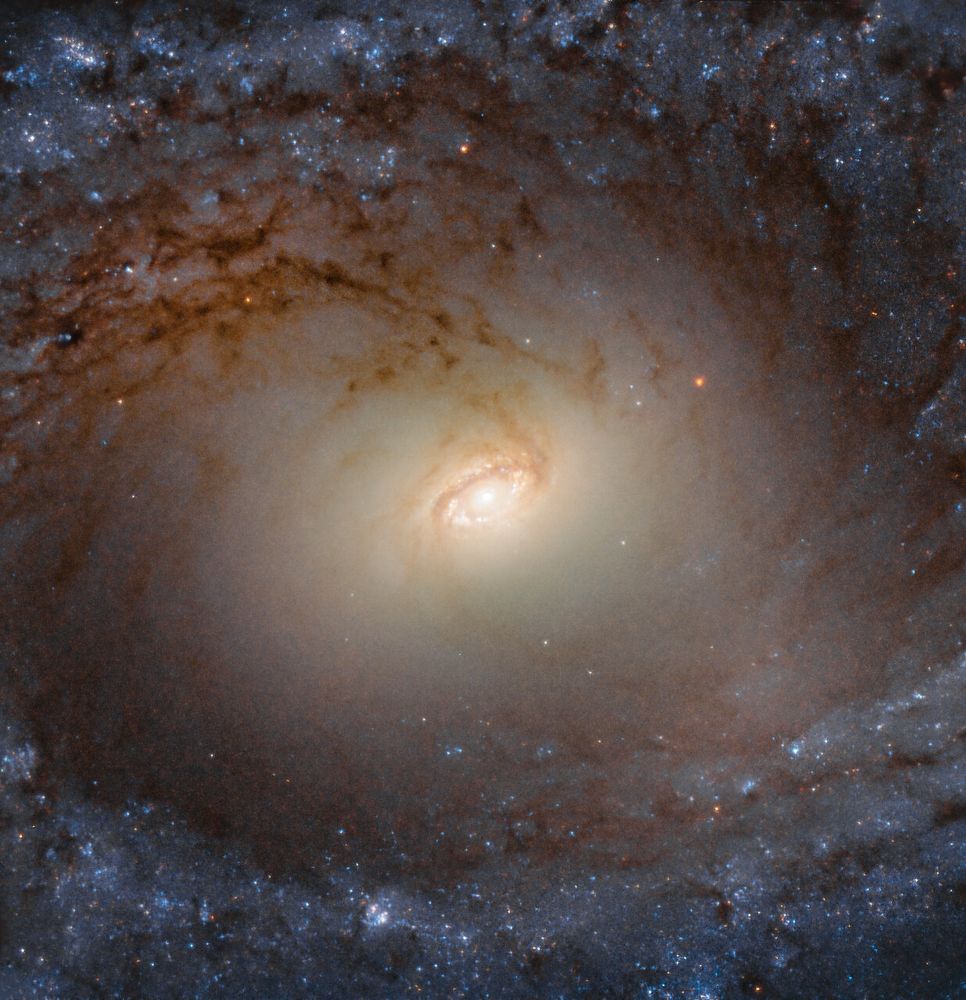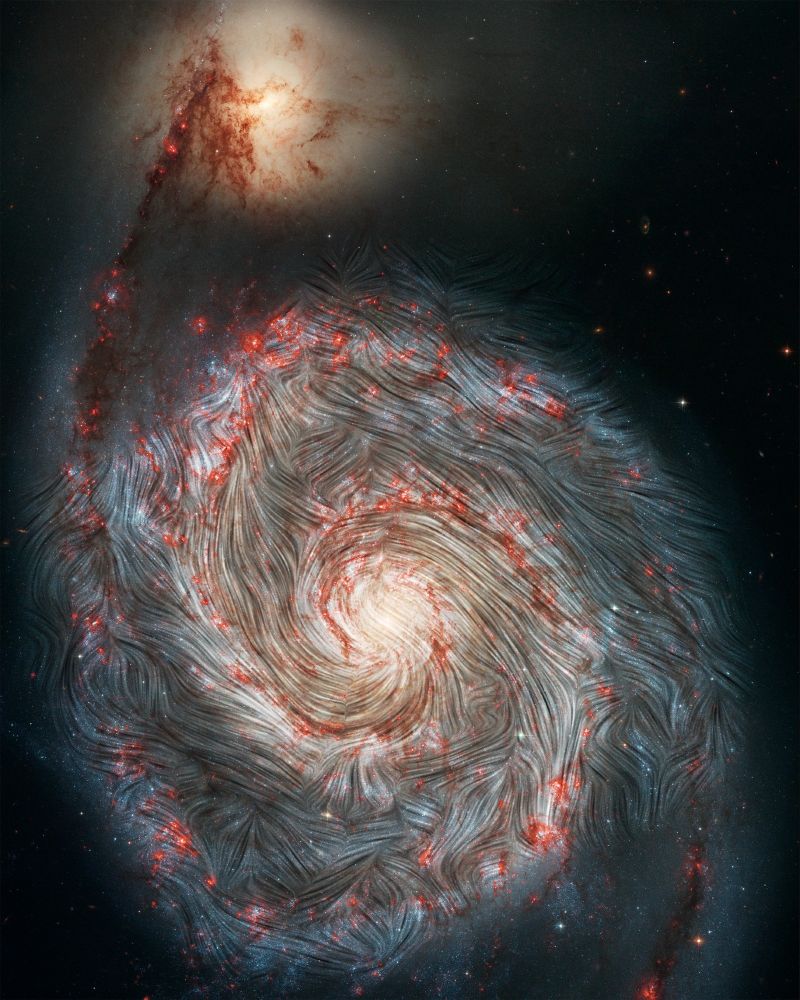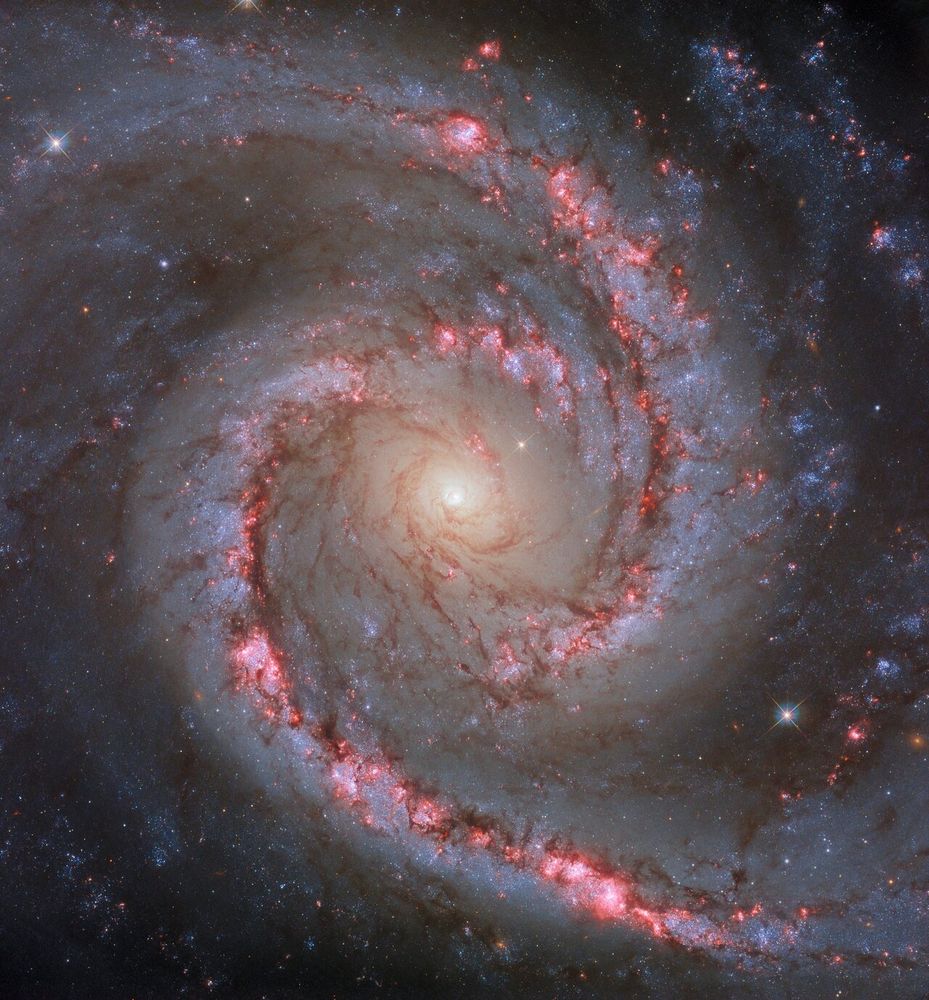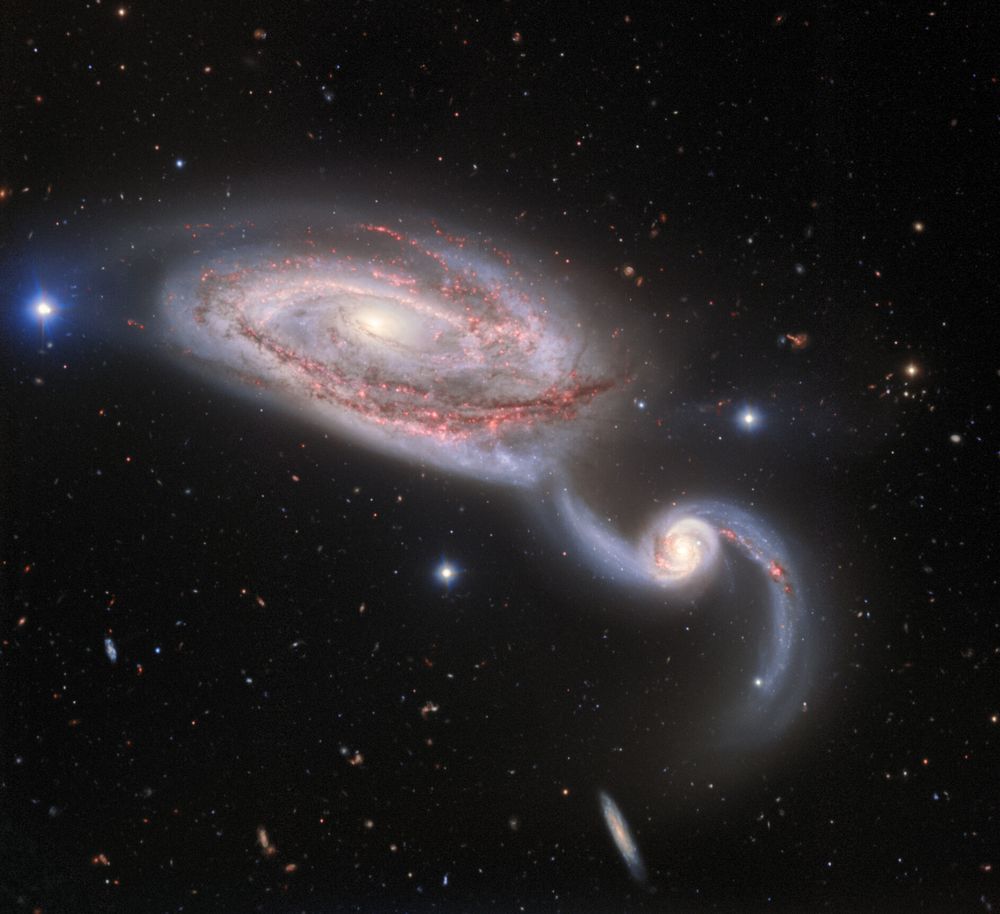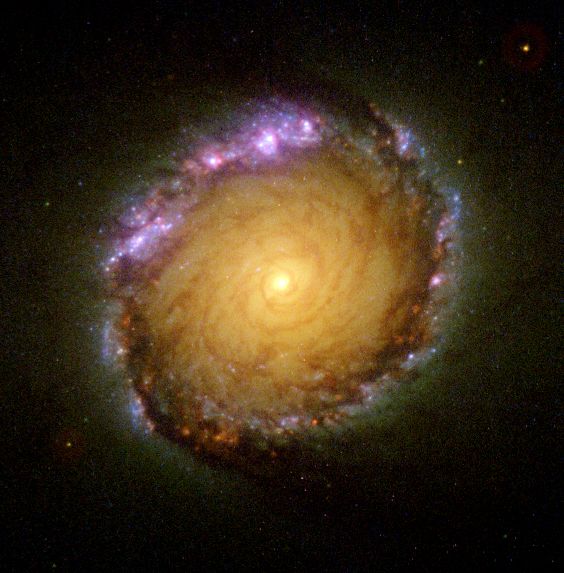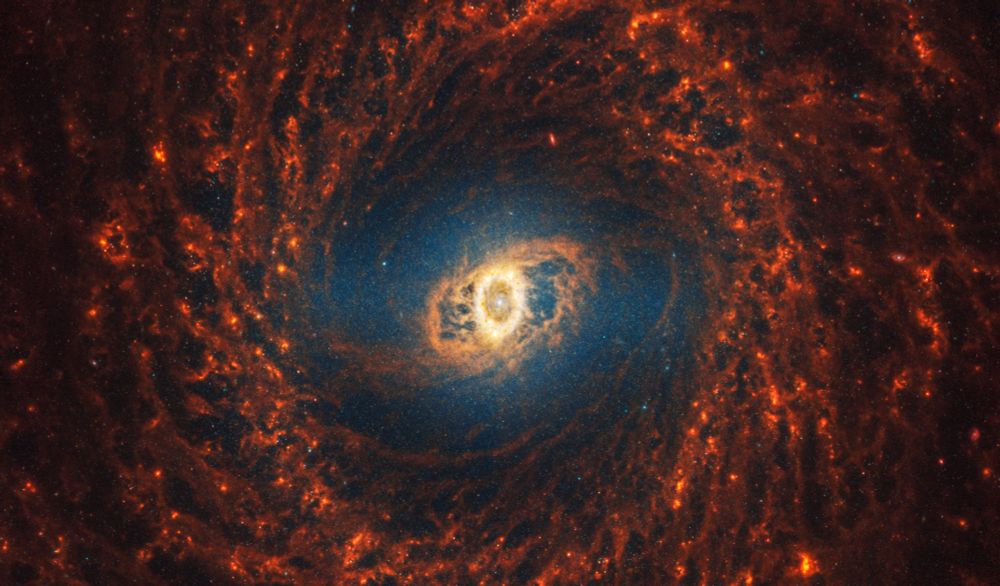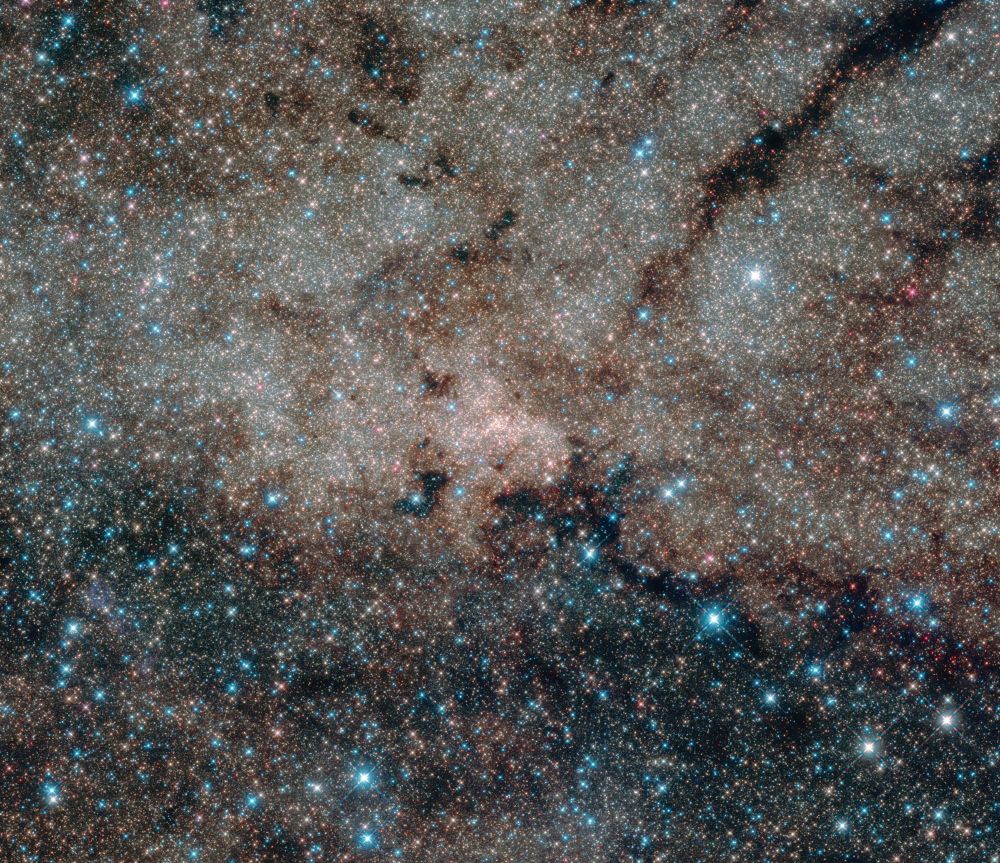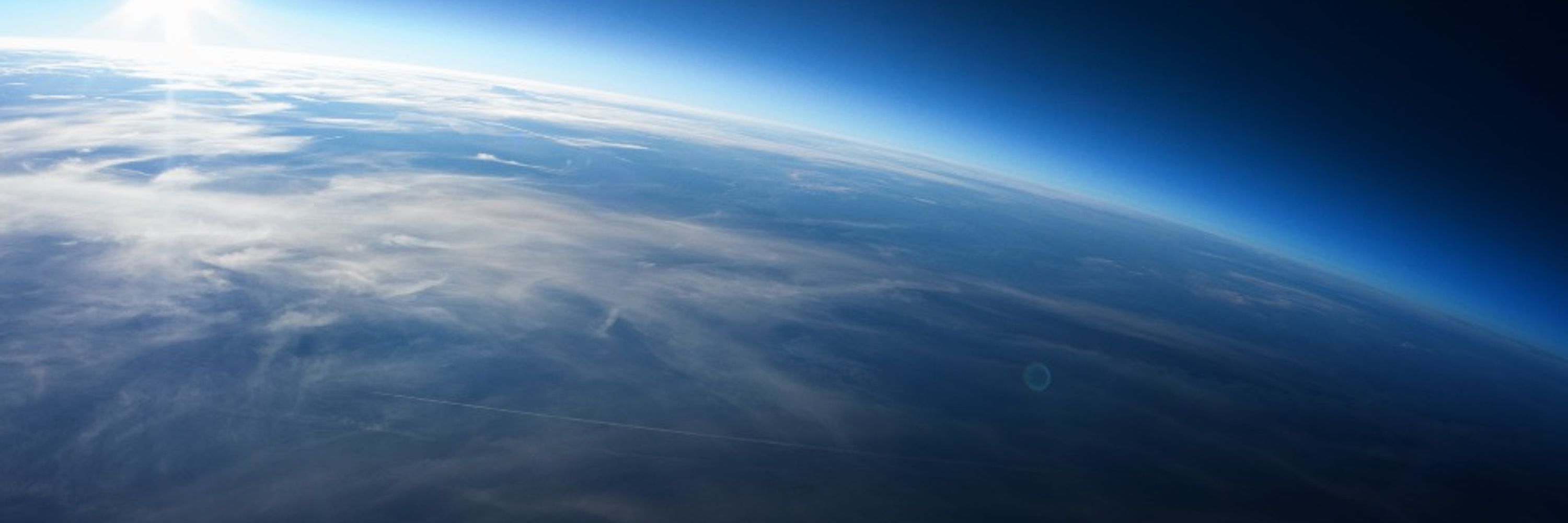

Universal-Sci
@universal-sci.bsky.social
The official Universal-Sci Bluesky account - Providing you with a selection of the most interesting science-related news and background stories - https://www.universal-sci.com/
created October 24, 2023
8,907 followers 5 following 827 posts
view profile on Bluesky Posts
 Universal-Sci (@universal-sci.bsky.social)
Universal-Sci (@universal-sci.bsky.social)
The breathtaking Gum 3 nebula, located about 3600 light-years away between Monoceros and Canis Major, shines with vivid red and pink hues from hydrogen atoms excited by nearby young stars (Credit: ESO/VPHAS+ team. Ack.: CASU)
 Universal-Sci (@universal-sci.bsky.social)
Universal-Sci (@universal-sci.bsky.social)
Arp 256, a striking duo of spiral galaxies 350 million light-years from Earth, collide in a dazzling cosmic dance. Hubble’s view reveals warped shapes and furious bursts of new stars. (Credit: ESA/Hubble, NASA)
 Universal-Sci (@universal-sci.bsky.social)
Universal-Sci (@universal-sci.bsky.social)
Gorgeous: Sculpted by powerful stellar winds, the cold hydrogen and dust pillars in the Carina Nebula stand as cosmic monuments! (Credit: NASA, ESA, and the Hubble Heritage Project (STScI/AURA); Acknowledgment: M. Livio (STScI) and N. Smith/University of California, Berkeley)
 Universal-Sci (@universal-sci.bsky.social)
Universal-Sci (@universal-sci.bsky.social)
IC 63—the Ghost Nebula drifts 550 light-years from Earth. It reflects the light of Gamma Cassiopeiae while glowing in hydrogen’s red, a rare blend of reflection and emission nebula. (Credit: ESA/Hubble, NASA)
 Universal-Sci (@universal-sci.bsky.social)
Universal-Sci (@universal-sci.bsky.social)
A striking X-ray/infrared composite image of 30 Doradus, the largest and brightest region of star formation in the Local Group of galaxies, including the Milky Way! (Credit: X-ray: NASA/CXC/Penn State Univ./L. Townsley et al.; IR: NASA/ESA/CSA/STScI/JWST ERO Production Team)
 Universal-Sci (@universal-sci.bsky.social)
Universal-Sci (@universal-sci.bsky.social)
Amazing! NGC 5714, a spiral galaxy 130 million light-years away in Boötes, seen edge-on. In 2003, it hosted a rare calcium-rich supernova, (SN 2003dr). These faint, fast-evolving explosions remain mysterious (Credit: ESA/Hubble & NASA)
 Universal-Sci (@universal-sci.bsky.social)
Universal-Sci (@universal-sci.bsky.social)
A breathtaking view of spiral galaxy NGC 1309, about 100 million light-years away in Eridanus. This view also captures hundreds of background galaxies. Every smudge of light is an entire galaxy! (Credit: ESA/Hubble & NASA, L. Galbany, S. Jha, K. Noll, A. Riess)
 Universal-Sci (@universal-sci.bsky.social)
Universal-Sci (@universal-sci.bsky.social)
This is the most distant star ever observed: www.universal-sci.com/article/the-...
 Universal-Sci (@universal-sci.bsky.social)
Universal-Sci (@universal-sci.bsky.social)
Why Jupiter's four largest moons are among the most interesting worlds of our solar system: www.universal-sci.com/article/four...
 Universal-Sci (@universal-sci.bsky.social)
Universal-Sci (@universal-sci.bsky.social)
Fascinating: UGC 6093, a barred spiral galaxy with a supermassive black hole at its core. It’s also a rare “megamaser,” blasting microwave light up to 100 million times brighter than those in the Milky Way! (Credit: ESA/Hubble & NASA)
 Universal-Sci (@universal-sci.bsky.social)
Universal-Sci (@universal-sci.bsky.social)
Do we actually need to wash our fruits and veggies? Here's the science: www.universal-sci.com/headlines/20...
 Universal-Sci (@universal-sci.bsky.social)
Universal-Sci (@universal-sci.bsky.social)
How big is the universe? www.universal-sci.com/article/astr...
 Universal-Sci (@universal-sci.bsky.social)
Universal-Sci (@universal-sci.bsky.social)
This stunning image shows a thin slice of a supernova remnant from a stellar blast over 1,000 years ago! (Credit: NASA, ESA, and the Hubble Heritage Team - STScI/AURA)
 Universal-Sci (@universal-sci.bsky.social)
Universal-Sci (@universal-sci.bsky.social)
A very interesting simulation of draining the oceans As time progresses and the oceans drain, it becomes evident that underwater mountain ranges are bigger in size and trenches are deeper in comparison to those on dry land (Credit: NASA's Scientific Visualization Studio/NOAA)
 Universal-Sci (@universal-sci.bsky.social)
Universal-Sci (@universal-sci.bsky.social)
You’re probably brushing your teeth wrong Here are four tips for better dental health: www.universal-sci.com/headlines/20...
 Universal-Sci (@universal-sci.bsky.social)
Universal-Sci (@universal-sci.bsky.social)
Hothouse Earth: our planet has been here before – here’s what it looked like: www.universal-sci.com/headlines/20...
 Universal-Sci (@universal-sci.bsky.social)
Universal-Sci (@universal-sci.bsky.social)
'“Earthrise” — We traveled a quarter-million miles to explore the Moon, and discovered Earth for the first time' - Neil deGrasse Tyson (Photo Credit: NASA/Bill Anders)
 Universal-Sci (@universal-sci.bsky.social)
Universal-Sci (@universal-sci.bsky.social)
This amazing view of Stephan’s Quintet shows a cluster of interacting galaxies roughly 300 million light-years away However, galaxy NGC 7320 (top centre), is not part of the spectacle. It lies about 8 times closer to us. (Credit: International Gemini Observatory/NOIRLab/NSF/AURA)
 Universal-Sci (@universal-sci.bsky.social)
Universal-Sci (@universal-sci.bsky.social)
Fascinating breakthrough - Did life begin like this? Scientist discovered how life’s building blocks may have first joined together: www.universal-sci.com/article/how-...
 Universal-Sci (@universal-sci.bsky.social)
Universal-Sci (@universal-sci.bsky.social)
This is why working out becomes harder the less you do it: www.universal-sci.com/article/why-...
 Universal-Sci (@universal-sci.bsky.social)
Universal-Sci (@universal-sci.bsky.social)
Do dogs understand the words we say to them? Here's the science: www.universal-sci.com/headlines/20...
 Universal-Sci (@universal-sci.bsky.social)
Universal-Sci (@universal-sci.bsky.social)
A Remarkable Discovery! Second-Ever Planet Forming Around a Sun-Like Star: www.universal-sci.com/article/disc...
 Universal-Sci (@universal-sci.bsky.social)
Universal-Sci (@universal-sci.bsky.social)
Intriguing: UGC 6093, a barred spiral galaxy that harbours a supermassive black hole at its centre. It’s also an uncommon “megamaser,” emitting microwave radiation up to 100 million times more intense than that found in the Milky Way. (Credit: ESA/Hubble & NASA)
 Universal-Sci (@universal-sci.bsky.social)
Universal-Sci (@universal-sci.bsky.social)
The speed of light: it’s fast, but also slow... (Credit: Dr. James O'Donoghue/physicsJ)
 Universal-Sci (@universal-sci.bsky.social)
Universal-Sci (@universal-sci.bsky.social)
''The universe is probably littered with the one-planet graves of cultures which made the sensible economic decision that there's no good reason to go into space - each discovered, studied, and remembered by the ones who made the irrational decision'' -- Randall Munroe
 Universal-Sci (@universal-sci.bsky.social)
Universal-Sci (@universal-sci.bsky.social)
Stunning: This image unveils new-born stars previously concealed by dense dust, showcasing a portion of the famed Christmas Tree Cluster.. Credit: NASA/JPL-Caltech/P.S. Teixeira (Center for Astrophysics)
 Universal-Sci (@universal-sci.bsky.social)
Universal-Sci (@universal-sci.bsky.social)
How to reduce your risk of dementia: www.universal-sci.com/headlines/20...
 Universal-Sci (@universal-sci.bsky.social)
Universal-Sci (@universal-sci.bsky.social)
Some perspective: A straightforward comparison between Earth, Mars and the Moon (Credit: Dr. James O_Donoghue/physicsJ)
 Universal-Sci (@universal-sci.bsky.social)
Universal-Sci (@universal-sci.bsky.social)
How much coffee is too much coffee? www.universal-sci.com/article/how-...
 Universal-Sci (@universal-sci.bsky.social)
Universal-Sci (@universal-sci.bsky.social)
NASA's Cassini spacecraft looks toward the night side of Saturn's largest moon and sees sunlight scattering through the periphery of Titan's atmosphere and forming a ring of colour. (Credit: NASA/JPL-Caltech/Space Science Institute)
 Universal-Sci (@universal-sci.bsky.social)
Universal-Sci (@universal-sci.bsky.social)
A stunning image of a small region on the edge of the inky Coalsack Nebula (Caldwell 99). Caldwell 99 is a dark nebula (A dense cloud of interstellar dust that completely blocks out visible wavelengths of light from objects behind it). (Credit: NASA, ESA, R. Sahai, Gladys Kober)
 Universal-Sci (@universal-sci.bsky.social)
Universal-Sci (@universal-sci.bsky.social)
A Spectacular Portrait of Centaurus A! (Credit: CTIO/NOIRLab/DOE/NSF/AURA)
 Universal-Sci (@universal-sci.bsky.social)
Universal-Sci (@universal-sci.bsky.social)
Messier 110 might seem unimpressive, but this dwarf elliptical galaxy near the Milky Way has a surprising twist: young, blue stars at its centre suggest unexpected activity, challenging its "dead" status. (Credit: ESA/Hubble & NASA, L.Ferrarese et al.)
 Universal-Sci (@universal-sci.bsky.social)
Universal-Sci (@universal-sci.bsky.social)
NGC 7678: a galaxy located about164 million light-years away in the constellation of Pegasus (The Winged Horse). With a diameter of around 115 000 light-years, this bright spiral galaxy is a similar size to our own galaxy (Credit: ESA/Hubble & NASA, A. Riess et al.)
 Universal-Sci (@universal-sci.bsky.social)
Universal-Sci (@universal-sci.bsky.social)
Hubble sometimes captures familiar objects from striking angles. In this, spiral galaxy NGC 3169 looks like we’re craning over a barrier (the thick dust in its arms) into its bright core. (Credit: ESA/Hubble & NASA, L. Ho)
 Universal-Sci (@universal-sci.bsky.social)
Universal-Sci (@universal-sci.bsky.social)
Here is why a bad memory is actually good for you: www.universal-sci.com/headlines/20...
 Universal-Sci (@universal-sci.bsky.social)
Universal-Sci (@universal-sci.bsky.social)
Spectacular: The Antennae Galaxies in Collision The galaxies are undergoing such an intense burst of star formation that astronomers describe them as a “starburst” phase. Eventually their cores will merge becoming a massive elliptical galaxy (Credit: ESA/Hubble & NASA)
 Universal-Sci (@universal-sci.bsky.social)
Universal-Sci (@universal-sci.bsky.social)
An intriguing infrared view of the barred spiral galaxy NGC 2283, located 45 million light-years away highlighting star clusters, gas clouds, and recent supernova activity (Credit: ESA/Webb, NASA & CSA, A. Leroy)
 Universal-Sci (@universal-sci.bsky.social)
Universal-Sci (@universal-sci.bsky.social)
The JWST reveals an infrared glimpse of NGC 346. Blue highlights silicates & PAH molecules, while red shows warm dust around massive stars. (Credit: NASA, ESA, CSA, STScI, Nolan Habel/NASA-JPL)
 Universal-Sci (@universal-sci.bsky.social)
Universal-Sci (@universal-sci.bsky.social)
Why our brain needs sleep, and what happens if we don’t get enough of it: www.universal-sci.com/headlines/20...
 Universal-Sci (@universal-sci.bsky.social)
Universal-Sci (@universal-sci.bsky.social)
Intriguing: NGC 1614, an unusual galaxy shaped by a past galactic merger, which has left it with a distinctive tidal tail—a stream of stars and gas extending outward. (Credit: ESA/Hubble/NASA/A. Adamo)
 Universal-Sci (@universal-sci.bsky.social) reply parent
Universal-Sci (@universal-sci.bsky.social) reply parent
Stellar winds expelled by large stars within the bubble's interior may have driven away the gas, but this is inconsistent with measured wind velocities in the bubble.
 Universal-Sci (@universal-sci.bsky.social)
Universal-Sci (@universal-sci.bsky.social)
A Mysterious “Superbubble” Hollows Out Nebula N44! The hole is about 250 light-years wide and its presence is still a mystery to this day.. (Credit: NASA, ESA, V. Ksoll and D. Gouliermis et al.; Processing: Gladys Kobe / Video by Universal-Sci)
 Universal-Sci (@universal-sci.bsky.social)
Universal-Sci (@universal-sci.bsky.social)
Fascinating! NGC 7027, known as the “Jewel Bug” nebula, has spent centuries quietly shedding its mass in a calm, spherical pattern. But more recently, it’s surprised astronomers by forming a striking new cloverleaf-shaped structure Credit: NASA, ESA, and J. Kastner (RIT)
 Universal-Sci (@universal-sci.bsky.social)
Universal-Sci (@universal-sci.bsky.social)
Very cool, a logarithmic Map of the Observable Universe! From left to right, spacecraft and celestial objects are positioned based on their distance from Earth. (Credit: Pablo Carlos Budassi)
 Universal-Sci (@universal-sci.bsky.social)
Universal-Sci (@universal-sci.bsky.social)
Should students be allowed to use AI at school?
 Universal-Sci (@universal-sci.bsky.social)
Universal-Sci (@universal-sci.bsky.social)
Building bricks on the moon from lunar dust: www.universal-sci.com/headlines/20...
 Universal-Sci (@universal-sci.bsky.social)
Universal-Sci (@universal-sci.bsky.social)
Fascinating: SNR 0454-67.2, a supernova remnant in the LMC. Likely born from a Type Ia explosion, it features red filaments amid dark clouds. Such supernovae shine with consistent brightness, making them vital “standard candles” for gauging cosmic distances. (Credit: ESA/Hubble, NASA)
 Universal-Sci (@universal-sci.bsky.social)
Universal-Sci (@universal-sci.bsky.social)
Intriguing: The spiral galaxy UGC 5460 recently hosted two apparent “supernovae”—but it turns out one was actually a luminous blue variable, a rare star type that erupts dramatically yet survives the explosion. (Credit: ESA/Hubble & NASA, W. Jacobson-Galán, A. Filippenko, J. Mauerhan)
 Universal-Sci (@universal-sci.bsky.social)
Universal-Sci (@universal-sci.bsky.social)
Iconic! Few of the Universe’s residents are as iconic as the spiral galaxy. This image captures a perfect example: NGC 2903, located about 30 million light-years away in the constellation Leo. (Credit: ESA/Hubble & NASA, L. Ho et al.)
 Universal-Sci (@universal-sci.bsky.social)
Universal-Sci (@universal-sci.bsky.social)
Alkaline vs lithium: what is the difference and which battery should you really buy? www.universal-sci.com/article/diff...
 Universal-Sci (@universal-sci.bsky.social)
Universal-Sci (@universal-sci.bsky.social)
Rings Upon Rings! Fascinating: NGC 2273 seems like a simple barred spiral galaxy, with two graceful arms winding from a central bar. Yet within these arms lie hidden rings—intricate spirals within a spiral... (Credit: ESA/Hubble & NASA, J. Greene)
 Universal-Sci (@universal-sci.bsky.social)
Universal-Sci (@universal-sci.bsky.social)
A view of the night sky that those of us that live on the northern hemisphere are missing The Southern Cross.
 Universal-Sci (@universal-sci.bsky.social)
Universal-Sci (@universal-sci.bsky.social)
Could we actually reach a black hole with a paperclip-sized spacecraft? www.universal-sci.com/article/reac...
 Universal-Sci (@universal-sci.bsky.social)
Universal-Sci (@universal-sci.bsky.social)
'A sea monster and a Tarantula' Behold this gorgeous part of the Tarantula Nebula, a large star-forming region in the LMC galaxy, 160,000 light-years away. The Nebula contains some of the most massive stars in the Universe! (Credit: ESA/Hubble & NASA, C. Murray)
 Universal-Sci (@universal-sci.bsky.social)
Universal-Sci (@universal-sci.bsky.social)
The spectacular remains of a stellar explosion: Supernova remnant SNR 0519, left behind by a white dwarf’s cataclysmic demise. (Credit: X-ray: NASA/CXC/GSFC/B. J. Williams et al.; Optical: NASA/ESA/STScI)
 Universal-Sci (@universal-sci.bsky.social)
Universal-Sci (@universal-sci.bsky.social)
An amazing zoom-in on the supermassive black hole anchoring M87, a giant elliptical galaxy 55 million light-years away! (Credit: NASA’s Goddard Space Flight Center)
 Universal-Sci (@universal-sci.bsky.social)
Universal-Sci (@universal-sci.bsky.social)
Stunning: The Butterfly Nebula (NGC 6302) lies about 3800 light-years away in Scorpius. Its glowing gas (formerly the star's outer layers) was expelled over 2200 years, forming a butterfly-shaped structure over two light-years wide! Credit: NASA, ESA, and J. Kastner (RIT)
 Universal-Sci (@universal-sci.bsky.social)
Universal-Sci (@universal-sci.bsky.social)
A breathtaking face-on view of the remarkable galaxy NGC 5335, classified as a flocculent spiral galaxy, featuring scattered, patchy streams of star formation spread across its disk. Credit: NASA, ESA, STScI, N. Bartmann (ESA/Hubble)
 Universal-Sci (@universal-sci.bsky.social)
Universal-Sci (@universal-sci.bsky.social)
Why do astronomers believe in dark matter? www.universal-sci.com/headlines/20...
 Universal-Sci (@universal-sci.bsky.social)
Universal-Sci (@universal-sci.bsky.social)
VISTA’s infrared view of the Cat’s Paw Nebula (Credit: ESO, J. Emerson, VISTA - Acknowledgment- Cambridge Astronomical Survey Unit)
 Universal-Sci (@universal-sci.bsky.social)
Universal-Sci (@universal-sci.bsky.social)
Pluto will not complete its first orbit around the Sun since its discovery until March 23, 2178!
 Universal-Sci (@universal-sci.bsky.social)
Universal-Sci (@universal-sci.bsky.social)
This image shows a vibrant slice of the Virgo Cluster from the Vera C. Rubin Observatory, featuring two bright spiral galaxies, three merging galaxies, distant galaxy groups, Milky Way stars, and more—highlighting the cosmos’s remarkable diversity. (Credit: NSF–DOE Vera C. Rubin Observatory)
 Universal-Sci (@universal-sci.bsky.social)
Universal-Sci (@universal-sci.bsky.social)
Breathtaking: IC 2051, a barred spiral galaxy 85 million light-years away in Mensa. Its flat disk features a bright central bulge of stars, a structure that shapes galaxy evolution and drives the growth of supermassive black holes. (Credit: ESA/Hubble & NASA, P. Erwin et al.)
 Universal-Sci (@universal-sci.bsky.social)
Universal-Sci (@universal-sci.bsky.social)
You’re eating microplastics in ways you don’t even realize: www.universal-sci.com/headlines/20...
 Universal-Sci (@universal-sci.bsky.social)
Universal-Sci (@universal-sci.bsky.social)
What is your real ‘biological age’, and what does this mean for your health: www.universal-sci.com/headlines/20...
 Universal-Sci (@universal-sci.bsky.social)
Universal-Sci (@universal-sci.bsky.social)
The hidden magnetic chaos within the Whirlpool Galaxy! (Credit: NASA, the SOFIA science team, A. Borlaff; NASA, ESA, S. Beckwith (STScI) and the Hubble Heritage Team (STScI/AURA))
 Universal-Sci (@universal-sci.bsky.social)
Universal-Sci (@universal-sci.bsky.social)
Journeying to Other Stars Without a Spaceship It is actually possible, here is how: www.universal-sci.com/article/inte...
 Universal-Sci (@universal-sci.bsky.social)
Universal-Sci (@universal-sci.bsky.social)
The giant Megalodon shark might have been even larger than previously thought: www.universal-sci.com/article/how-...
 Universal-Sci (@universal-sci.bsky.social)
Universal-Sci (@universal-sci.bsky.social)
Why you don't actually need 8 hours of sleep per night: www.universal-sci.com/article/you-...
 Universal-Sci (@universal-sci.bsky.social)
Universal-Sci (@universal-sci.bsky.social)
Gorgeous: The spiral galaxy NGC 1566, known as the ‘Spanish Dancer Galaxy' It is part of the Dorado galaxy group and is located about 60 million light-years away in the constellation Dorado. (Credit: ESA/Hubble & NASA, D. Calzetti and the LEGUS team, R. Chandar)
 Universal-Sci (@universal-sci.bsky.social)
Universal-Sci (@universal-sci.bsky.social)
How much daily walking do you need if you want to live longer? Here's the science: www.universal-sci.com/article/how-...
 Universal-Sci (@universal-sci.bsky.social)
Universal-Sci (@universal-sci.bsky.social)
Why Doesn't Earth Have Rings? www.universal-sci.com/headlines/20...
 Universal-Sci (@universal-sci.bsky.social)
Universal-Sci (@universal-sci.bsky.social)
NGC 5395 (left) is a spectacular spiral galaxy about 160 million light-years away in Canes Venatici. Its distorted shape and off-centre ring are the result of a dramatic interaction with its smaller neighbour, NGC 5394 (Credit: International Gemini Observatory/NOIRLab/NSF/AURA)
 Universal-Sci (@universal-sci.bsky.social)
Universal-Sci (@universal-sci.bsky.social)
From Oceans to Cosmic Shores: How Our View of Habitable Worlds and Zones Is Evolving: www.universal-sci.com/headlines/20...
 Universal-Sci (@universal-sci.bsky.social)
Universal-Sci (@universal-sci.bsky.social)
Lay your eyes on the unique core of this 30 million light-years distant galaxy's called NGC 1512. The core is remarkable for its stunning 2,400 light-year-wide circle of infant star clusters, called a "circumnuclear" starburst ring. (Credit: NASA, ESA, and D. Maoz)
 Universal-Sci (@universal-sci.bsky.social)
Universal-Sci (@universal-sci.bsky.social)
Dear followers: Universal-Sci Weekly 111 is out! Too busy to follow science news during the week? Consider subscribing (it's 100% free) and get the 5 most interesting articles of the week in your mailbox: substack.com/home/post/p-...
 Universal-Sci (@universal-sci.bsky.social)
Universal-Sci (@universal-sci.bsky.social)
Is it true pasta doesn’t make you gain weight, and could even help you lose it? Here is the science: www.universal-sci.com/headlines/20...
 Universal-Sci (@universal-sci.bsky.social)
Universal-Sci (@universal-sci.bsky.social)
Spectacular: Rays and shadows streaming from the centre of the nearby galaxy IC 5063, caused by a supermassive black hole and a dusty ring around it.. This effect, similar to sunset rays on Earth, stretches across 36,000 light-years! Credit: NASA, ESA, and W.P. Maksym (CfA)
 Universal-Sci (@universal-sci.bsky.social)
Universal-Sci (@universal-sci.bsky.social)
Behold the majestic spiral galaxy NGC 3511, located 43 million light-years away in the constellation Crater (The Cup). (Credit: ESA/Hubble & NASA, D. Thilker)
 Universal-Sci (@universal-sci.bsky.social)
Universal-Sci (@universal-sci.bsky.social)
One workout might be all it takes to save your life Here is why: www.universal-sci.com/headlines/20...
 Universal-Sci (@universal-sci.bsky.social)
Universal-Sci (@universal-sci.bsky.social)
A stunning view of the Trifid and Lagoon Nebulae! The Trifid Nebula features colourful clouds and dark lanes shaped by newborn stars. To the right, the Lagoon Nebula is another active star-forming region, sculpted by young stars (Video by Universal-Sci/Credit: NSF–DOE Vera C. Rubin Observatory)
 Universal-Sci (@universal-sci.bsky.social)
Universal-Sci (@universal-sci.bsky.social)
A glimpse of the future! Arp 243 is in a late stage of merging. It is thought that the Milky Way will eventually resemble NGC 2623 when it collides with our neighbouring galaxy, the Andromeda Galaxy, in four billion years time. (Credit: ESA/Hubble & NASA)
 Universal-Sci (@universal-sci.bsky.social)
Universal-Sci (@universal-sci.bsky.social)
The surprising reason why noon might be your best bet for passing your exam or nailing your job interview, according to science: www.universal-sci.com/article/why-...
 Universal-Sci (@universal-sci.bsky.social)
Universal-Sci (@universal-sci.bsky.social)
A breathtaking view of NGC 6188, also known as the Firebird nebula, located about 4100 light-years away in the constellation Ara. This gas cloud harbours a cluster of young stars called NGC 6193 (Credit: ESO/VVVX survey / video by Universal-Sci)
 Universal-Sci (@universal-sci.bsky.social)
Universal-Sci (@universal-sci.bsky.social)
Is It Actually Safe to Eat Food That’s Fallen on the Floor? Here is the science: www.universal-sci.com/headlines/20...
 Universal-Sci (@universal-sci.bsky.social)
Universal-Sci (@universal-sci.bsky.social)
Take a moment to take this in: This incredible image from the JWST reveals a huge number of galaxies, each home to billions of stars... Credit: ESA/Webb, NASA & CSA, G. Gozaliasl, A. Koekemoer, M. Franco, the COSMOS-Web team, N. Bartmann (ESA/Webb)
 Universal-Sci (@universal-sci.bsky.social)
Universal-Sci (@universal-sci.bsky.social)
What Is The Wettest Place On Earth? www.universal-sci.com/headlines/20...
 Universal-Sci (@universal-sci.bsky.social)
Universal-Sci (@universal-sci.bsky.social)
A beautiful view of the wonderous Dun Briste sea stack... Dun Briste provides us with a rare glimpse of the Carboniferous. (A 60-million-year-long period lasting from about 359 million to 299 million years ago)
 Universal-Sci (@universal-sci.bsky.social)
Universal-Sci (@universal-sci.bsky.social)
A bright foreground star can’t overshadow the grandeur of galaxy UGC 3855 Many young blue stars are sprinkled throughout the circular patterns of its arms, contrasted and complemented by dark lanes of dust following the spiral structure. (Credit: ESA/Hubble & NASA, J. Walsh)
 Universal-Sci (@universal-sci.bsky.social)
Universal-Sci (@universal-sci.bsky.social)
Annoyed by mosquitoes? Here's how to get rid of them, according to science: https://www.universal-sci.com/article/how-to-get-rid-of-mosquitoes-according-to-science
 Universal-Sci (@universal-sci.bsky.social)
Universal-Sci (@universal-sci.bsky.social)
A gorgeous view of a celestial shadow known as the Circinus West molecular cloud, located 2,500 light-years away.. (Credit: CTIO/NOIRLab/DOE/NSF/AURA - Image Processing: T.A. Rector (University of Alaska Anchorage/NSF NOIRLab), D. de Martin & M. Kosari (NSF NOIRLab) - Video by Universal-Sci)
 Universal-Sci (@universal-sci.bsky.social)
Universal-Sci (@universal-sci.bsky.social)
Amazing: Webb’s high-resolution infrared images vividly depict the gas and dust in NGC 3351 as stark shades of orange and red, revealing intricate spiral shapes with jagged, yet diffuse edges. (Credit: NASA, ESA, CSA, STScI, Janice Lee (STScI), Thomas Williams (Oxford), PHANGS Team)
 Universal-Sci (@universal-sci.bsky.social)
Universal-Sci (@universal-sci.bsky.social)
The heart of our Milky Way galaxy Looking at these kind of pictures makes you wonder how many planets might be hidden within this single view... Credit: NASA, ESA, and the Hubble Heritage Team (STScI/AURA), T. Do, A. Ghez (UCLA), V. Bajaj (STScI)
 Universal-Sci (@universal-sci.bsky.social)
Universal-Sci (@universal-sci.bsky.social)
A gorgeous view of DEM L249, the remains of a supernova in the Large Magellanic Cloud, a satellite galaxy of the Milky Way about 160,000 light-years away. It was likely created by a Type 1a supernova, the explosive end of a white dwarf star in a binary system. (Credit: ESA/Hubble & NASA, Y. Chu)
 Universal-Sci (@universal-sci.bsky.social)
Universal-Sci (@universal-sci.bsky.social)
Lunar Soil Shows Potential to Sustain Life on the Moon: www.universal-sci.com/article/luna...
 Universal-Sci (@universal-sci.bsky.social)
Universal-Sci (@universal-sci.bsky.social)
Science explains why people gain weight as they age: www.universal-sci.com/headlines/20...
 Universal-Sci (@universal-sci.bsky.social)
Universal-Sci (@universal-sci.bsky.social)
Electronics are getting small, and that is causing big problems: www.universal-sci.com/headlines/20...
 Universal-Sci (@universal-sci.bsky.social)
Universal-Sci (@universal-sci.bsky.social)
Amazing picture: A close-up of Uranus's aurorae (Credit: ESA/Hubble, NASA, L. Lamy, L. Sromovsky)
 Universal-Sci (@universal-sci.bsky.social)
Universal-Sci (@universal-sci.bsky.social)
A good night's sleep starts during the day Here are 10 simple tips to improve sleep quality: www.universal-sci.com/article/ten-...
Universal-Sci (@universal-sci.bsky.social)


